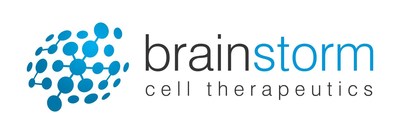BrainStorm Cell Therapeutics Presented Positive Survival Data from NurOwn® Expanded Access Program at 2024 Annual NEALS Meeting
Biomarker data suggest ALS patients may benefit from longer-term treatment with NurOwn
Poster highlighting design of planned Phase 3b NurOwn trial also presented

Debamestrocel Long-Term Benefits on Survival and Neurodegeneration in ALS Expanded Access Program (
- Ten participants (6 debamestrocel, 4 placebo) from Brainstorm's prior Phase 3 clinical trial (BCT-002-US) were enrolled in an open label Expanded Access Program (EAP). The EAP spanned two 28-week periods, with a break in time between the periods. Participants received an intrathecal dose of Debamestrocel every 8 weeks, for a maximum of 6 doses over the 2 periods.
- Baseline characteristics from 10 EAP participants, captured at the time they entered the Phase 3 trial, were matched against a comparable cohort from the PRO-ACT historical database using propensity score matching (PSM).
- Matching covariates for PSM included time since disease onset, pre-baseline ALSFRS-R slope, age, Slow/Forced Vital Capacity (SVC/FVC), and site of onset, with a 10:1 matching ratio. A Kaplan-Meier (KM) plot was generated, and a log rank test (LRT) was performed to compare survival between the two groups. A longitudinal plot of neurofilament light (NfL) was generated to assess long-term effects on neurodegeneration.
- At the last available visit in the EAP, 9/10 participants were alive. The survival curves revealed a statistically significant difference in favor of debamestrocel (LRT, p= 0.0379) with a median survival time of 46.6 months for the debamestrocel group compared to 41.1 months for the matched control.
- Among the six 'early-start' participants (those who had received Debamestrocel during the Phase 3 study), a continual reduction in NfL was observed. In contrast, for those who received placebo in the Phase 3, the group median NfL change was 37% by the end of phase 3, indicating worsening neurodegeneration. However, after these participants received debamestrocel in the EAP, the majority showed a stabilization in NfL levels.
"We were pleased to provide this important update from the NurOwn EAP with the ALS community at this year's NEALS meeting," said
An Overview of The Phase 3b Clinical Trial of Debamestrocel in ALS (
- Up to approximately 200 participants with ALS are expected to enroll in the two-part trial, to receive 3 doses of either debamestrocel or placebo for 24 weeks (Part-A), followed by an open label period of receiving 3 doses debamestrocel for another 24 weeks (Part B).
- Participants in both treatment arms will be able to receive standard of care while on study.
- The key entry criteria will include: age 18 to 75 years old, ALS diagnosis defined by the revised El Escorial criteria as laboratory-supported probable, clinically probable, or definite, symptom onset within 24 months of screening, ≥2 points on each item of the ALSFRS-R, ALSFRS-R total score ≤45, and upright Slow Vital Capacity (SVC) ≥65% of predicted.
- The primary efficacy endpoint will be a comparison of change in ALSFRS-R from baseline to week-24 (i.e. at the end of Part A) for debamestrocel vs. placebo.
- Other outcome assessments will include CAFS (Clinical Assessment of Function & Survival), SVC, HHD (Hand-Held Dynamometry) ALSAQ-40 questionnaire, the ZBI (Zarit Burden Interview), and survival.
- CSF and blood samples will be collected for analysis of biomarkers of neuroinflammation, neurodegeneration, and neuroprotection. A sample using an oral swab can be collected for DNA evaluation of ALS-related genes (optional).
Copies of the posters can be viewed online by registered attendees of the NEALS Meeting and will be available on the BrainStorm corporate website.
The NurOwn® technology platform (autologous MSC-NTF cells) represents a promising investigational therapeutic approach to targeting disease pathways important in neurodegenerative disorders. MSC-NTF cells are harvested from each person with ALS and are manufactured using an innovative and proprietary process, to secrete neurotrophic factors to target specific neurodegenerative diseases. The lead program for NurOwn is for the treatment of ALS. BrainStorm's long-term commitment to ALS is demonstrated in preclinical research and a series of clinical studies, all of which have been published in peer-reviewed journals.
The NurOwn clinical program has generated valuable insights into the pathology of ALS, as well as disease progression and treatment. Since the initial Phase 3 readout, BrainStorm has shared the full dataset through rigorous peer-reviewed analysis, including: quantification of Floor Effect, which had been noted, but never before explored in depth; evaluation of multiple pre-specified biomarkers, collected at seven different points across 20 weeks during the trial, allowing a longitudinal view; and analysis of genetic data, which represents one of the first ALS trials to prospectively invoke pharmacogenomic analysis of clinical outcome, offering great promise for the development of future treatments for ALS.
About
Notice Regarding Forward-Looking Statements
This press release contains "forward-looking statements" that are subject to substantial risks and uncertainties, including statements regarding meetings with the
CONTACTS
Media:
Phone: +1 202-330-3431
lisa.guiterman@gmail.com
IR:
Phone: +1 646-597-6983
mwood@lifesciadvisors.com
Logo: https://mma.prnewswire.com/media/1166536/BrainStorm_Logo.jpg
![]() View original content:https://www.prnewswire.com/news-releases/brainstorm-cell-therapeutics-presented-positive-survival-data-from-nurown-expanded-access-program-at-2024-annual-neals-meeting-302288404.html
View original content:https://www.prnewswire.com/news-releases/brainstorm-cell-therapeutics-presented-positive-survival-data-from-nurown-expanded-access-program-at-2024-annual-neals-meeting-302288404.html
SOURCE
